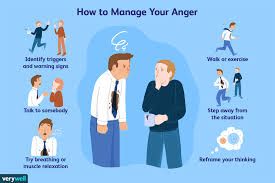Anger Management
Jun 09, 2019 • 3 views
Genius is the ability to renew one's emotions in daily experience.
What is anger ?
Anger is an emotion of displeasure, irritation, fury or aggression, a behavioral that is intended to cause damage or injury. Anger is a normal, and a healthy emotions . But it is important to deal with it in a positive way. Before reacting to a situation, one must be aware of the impact it will have.
Anger is the only one letter short of DANGER.
Uncontrolled anger can tell on your health- mental and physical, your performance and even on your relationships. Unresolved anger is linked to high blood pressure, anxiety, depression, heart attack, colds, flu and problems with digestion. People avoid people with a temper as it gives off negative emotions and bitterness.

You are the master of your own actions. You may choose to react or simply refuse to react.
Two common sources of anger-
Threat- Power issue
Frustration- Unmet needs
Ways of expressing anger-
Turned outward- Hurt, displaced, taking it out on something or someone else.
Turned Inward- Depressed, alone
Resolved- express feelings, problem solved
Anger can be a positive emotional force if expressed constructively by:
Expressing grievances so they can be addressed
Remaining focussed on problem solving
Energizing social change
The negative aspects of anger are that you can have disruption of your thinking, unnecessarily defend yourself, become aggressive and become known as an angry person.
ANGER- Negative thoughts, change in behavior (shouting, screaming, criticising, disobeying), low self-esteem, low performance.
Temper is one thing you can't get rid of by losing.
Swami Vivekananda was also known for his fits of anger, though he understood later that contracting and managing it was far more useful than displaying it.
HOW TO DEAL WITH ANGER
Before reacting, count till ten/very angry-make it hundred. It will slow you down and diffuse your anger.
As soon as you are thinking clearly-state/express your displeasure/anger in a non-hurtful way.
Physical activity provides an outlet to your emotion, especially when you are about to erupt.
Think before you speak. Don't blurt out something that you will later regret. Collect your thoughts before saying anything.
Learning to control anger is a challenge. Consider seeking advice from a parent, friend, teacher or even a professional.

For every minute you remain angry, you give up sixty seconds of happiness and peace of mind
